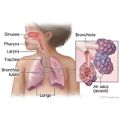Our Health Library information does not replace the advice of a doctor. Please be advised that this information is made available to assist our patients to learn more about their health. Our providers may not see and/or treat all topics found herein.
Topic Contents
Bronchiolitis
Condition Basics
What is bronchiolitis?
Bronchiolitis is an infection of the bronchioles, the small air passages in the lungs. It is common in infants and is the leading cause of serious lower respiratory illness.
What causes it?
Bronchiolitis is caused by a virus, especially respiratory syncytial virus (RSV), and frequently occurs in the late fall to early spring.
What are the symptoms?
Symptoms of bronchiolitis include runny nose, cough, and fever. After a few days, your child may experience shortness of breath and/or breathing that is rapid and labored with wheezing. A severe infection in infants may cause a noticeably increased breathing rate.
If your child has heart disease or was born prematurely, call your doctor at the first sign of bronchiolitis.
Symptoms of bronchiolitis are the worst in the first 5 days. Most children get better in 1 to 2 weeks.
How is it diagnosed?
A doctor may diagnose bronchiolitis based on a medical history, your child's symptoms, and a physical exam. Testing is usually not needed if your doctor suspects the bronchiolitis is caused by RSV.
How is bronchiolitis treated?
Home treatment to manage the symptoms of bronchiolitis is usually all that is needed. Have your child drink plenty of liquids to avoid dehydration. If your baby has a stuffy nose, use a suction bulb to remove mucus. Fever medicine (such as acetaminophen or ibuprofen) may help reduce fever discomfort. Over-the-counter cough and cold medicines are not recommended. Be safe with medicines. Read and follow all instructions on the label. Do not give aspirin to anyone younger than 20 because of the risk of Reye syndrome, a serious illness.
The doctor may suggest bronchodilator medicine if your child has shown the tendency to have allergic reactions (atopy). In severe cases, your child may need to stay in the hospital or get extra oxygen.
How can you prevent it?
It is common for children to get respiratory problems (such as bronchiolitis caused by a viral infection), because they are often exposed to people who have infections to which they have not built up immunity. Bronchiolitis is spread just like a cold. To prevent bronchiolitis:
- Avoid contact with other children who have bronchiolitis or upper respiratory infections. If there is an ill child in the home, separate them from other children, if possible. Put the child in a room alone to sleep. If your child has bronchiolitis, keep them home from school or day care until they get better.
- Wash your hands often to prevent spreading the disease. Hand-washing removes the germs on your hands and helps stop the spread of germs to your child when you touch your child or touch an object they might touch.
- Do not smoke or use other tobacco products around your child. Secondhand smoke irritates the mucous membranes in your child's nose, sinuses, and lungs and increases the risk for respiratory infections.
Sometimes medicines are used to help prevent respiratory syncytial virus (RSV) infections in babies and children who are at risk for problems from RSV.
Related Information
Credits
Current as of: October 24, 2024
Author: Ignite Healthwise, LLC Staff
Clinical Review Board
All Ignite Healthwise, LLC education is reviewed by a team that includes physicians, nurses, advanced practitioners, registered dieticians, and other healthcare professionals.
Current as of: October 24, 2024
Author: Ignite Healthwise, LLC Staff
Clinical Review Board
All Ignite Healthwise, LLC education is reviewed by a team that includes physicians, nurses, advanced practitioners, registered dieticians, and other healthcare professionals.
This information does not replace the advice of a doctor. Ignite Healthwise, LLC disclaims any warranty or liability for your use of this information. Your use of this information means that you agree to the Terms of Use and Privacy Policy. Learn how we develop our content.
To learn more about Ignite Healthwise, LLC, visit webmdignite.com.
© 2024-2025 Ignite Healthwise, LLC.





